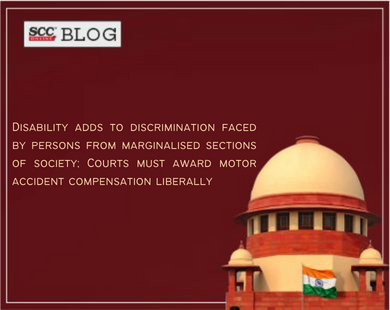Supreme Court: In a Motor Vehicle accident claim case, the bench of Krishna Murari* and S. Ravindra Bhat, JJ has observed that while awarding compensation in cases of permanent disability caused to claimants, the courts must look at the case in totality, and must consider the socio-economic background of the claimants.
Noting that the persons from marginalised backgrounds often face an additional layer of discrimination due to bodily disabilities, the Court observed that,
“Persons from marginalised sections of the society already face severe discrimination due to a lack of social capital, and a new disability more often than not compounds to such discrimination. In such circumstances, to preserve the essence of justice, it becomes the duty of the Court to at the very least restore the claimant as best as possible to the position he was in before the occurrence of the disability, and to do so must award compensation in a liberal manner.”
In the case at hand, the claimant, belonging to an economically weaker section of the society, was severely injured in an accident when the bus he was travelling in, hit a parked tempo due to rash and negligent driving of the bus driver. He suffered permanent disability of 70%, his right lower limb amongst other injuries. The claimant was aged 37 years at the time of the accident and was earning Rs.10,000/- per month.
While he had sought a compensation of Rs. 20 Lakhs before the Motor Accident Claims Tribunal (MACT), he was only awarded the compensation of around Rs. 15,76,465 along with 7.5% interest per annum. The Delhi High Court slightly enhanced the compensation to Rs.16,70,932/- with 9% interest per annum. [2018 SCC OnLine Del 11324]
The Supreme Court, however, modified the judgment and held that the claimant was entitled to be awarded compensation to the tune of Rs. 38,70,120/- along with 9% interest per annum from the date of making the application.
While holding so, the Court observed that,
“While no material compensation can completely negate the trauma and suffering that the injured and his family faces, the law only knows the language of monetary compensation in such cases. It then becomes to duty of the court to translate the provisions of monetary compensation into a fabrication that helps the injured and his family in coping with their loss.”
[Mohd. Sabeer v. U.P. SRTC, 2022 SCC OnLine SC 1701, decided on 09.12.2022]






